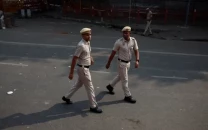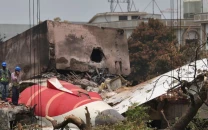Britain to quiz MI5 over intelligence failure

Britain to quiz MI5 over intelligence failure
Judge Heather Hallett also ruled that inquests into four suicide bombers will be held separately from those of the 52 victims, a decision which was welcomed by the families of the victims who had protested plans to hold the inquests together. The suicide bombers set off near-simultaneous explosions on three London underground trains and a double-decker bus on the morning of July 7, 2005, in what has come to be known as 7/7.
Hallett, giving details of arrangements for inquests due to start in October, said they would probe what the police and MI5 knew ahead of the attacks. “The scope of the inquest into the 52 deaths will include the alleged intelligence failings and the immediate aftermath of the bombings.” “To my mind it is not too remote to investigate what was known in the year or two before the alleged bombings. Plots of this kind are not developed overnight,” she added. Hallett also announced that the inquests will not be held with a jury, and that the hundreds of people injured in the attacks will not be designated “interested person” status — granting the right to crossexamine witnesses.
Survivors of the bombings voiced disappointment. “Once again we have been shunted aside by officialdom and those questions may or may not be answered,” said Jacqui Putnam, who survived the Edgware Road blast. The 7/7 attacks struck during rush hour on a Thursday morning, as British Prime Minister Tony Blair was meeting with Group of Eight (G8) counterparts for a summit in Gleneagles, Scotland. Three bombs exploded shortly after 8:50 am: Mohammad Sidique Khan, 30, blew himself up at Edgware Road station, 22-year-old Shehzad Tanweer at Aldgate, and Jermaine Lindsay, 19, between King’s Cross and Russell Square.
Hasib Hussain, 18, detonated his device on board a bus at Tavistock Square. Some 700 people were injured in the blasts. It later emerged that intelligence services had followed the bombers’ ringleader, Khan, in early 2004 during an investigation into another bomb plot.
Published in the Express Tribune, May 22nd, 2010.



















COMMENTS
Comments are moderated and generally will be posted if they are on-topic and not abusive.
For more information, please see our Comments FAQ